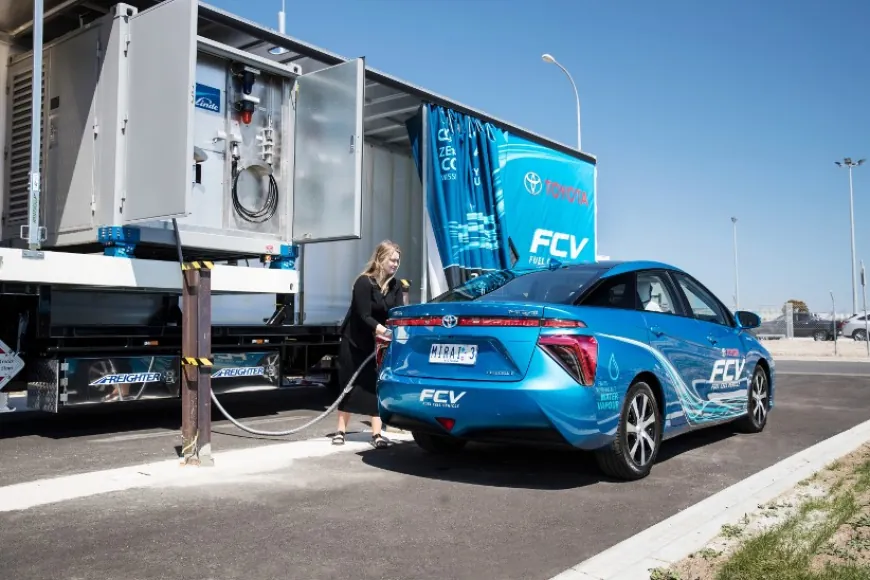Hydrogen Vehicle: An Environmentally Friendly Alternative for the Future of Transportation
Fuel cell electric vehicless operate using hydrogen as fuel instead of gasoline or diesel. The hydrogen is either stored in high-pressure tanks or absorbed in metal hydrides.

Fuel cell electric vehicless operate using hydrogen as fuel instead of gasoline or diesel. The hydrogen is either stored in high-pressure tanks or absorbed in metal hydrides. Fuel cells then convert the hydrogen and oxygen from the air into electricity to power an electric motor. This process produces only water and heat as byproducts.
How Hydrogen Vehicle
In a hydrogen fuel cell vehicle, the fuel cell stack combines hydrogen from the vehicle's tank with oxygen from the air to produce electricity. This electricity powers the electric motor that drives the wheels, similar to an electric vehicle. Only hydrogen, oxygen, and water are involved, making the vehicle very energy efficient and environmentally friendly. No greenhouse gases or other pollutants are emitted from the tailpipe.
Inside a Fuel Cell
A fuel cell works similarly to a battery but does not run down or need recharging. It continually produces electricity as long as hydrogen is supplied. Each individual fuel cell contains an anode and cathode separated by an electrolyte. When hydrogen is introduced to the anode, it is split into protons and electrons. The protons pass through the electrolyte to the cathode, while the electrons are routed through a circuit providing power before reunited with the protons and oxygen at the cathode to produce water. Multiple cells are stacked to increase the voltage created.
Fueling a Fuel cell electric vehicles
Hydrogen can be produced from various domestic sources such as natural gas or water through electrolysis using renewable energy. Fueling stations pump gaseous or liquid hydrogen into the vehicle's tank at high pressures, similar to gas stations. Fueling times are fast, only taking about 5 minutes to fill up a tank capable of providing a range similar to gasoline vehicles. Sensors ensure maximum safety during fueling and operation.
Advantages of Driving on Hydrogen
The main benefits of Fuel cell electric Hydrogen Vehicles are their environmental friendliness and energy efficiency. No conventional emissions are produced, helping reduce air pollution in urban areas. As hydrogen can be produced from renewable resources like solar, wind and hydroelectric power, these vehicles can help transition to a clean energy economy. Their fuel cells are about twice as efficient as a gasoline engine at converting stored energy into motive power. This makes operation much more cost effective over the long run compared to gasoline. Being electric, hydrogen cars are also very smooth and quiet.
Challenges for Widespread Adoption
While hydrogen fuel cell technology promises great advantages, several challenges still need to be addressed for widespread market adoption. An infrastructure of fueling stations must be built to support consumer demand. Currently availability is very limited in most parts of the world due to high installation costs. Economies of scale will help reduce costs over time as production increases. Higher pressures are required to store sufficient hydrogen on board vehicles, which increases complexity and safety standards needed. Public awareness and education around the technology also lag behind battery electric vehicles. Substantial government funding and incentives will be required to accelerate these solutions.
Future Applications
Major automakers like Toyota, Hyundai and Honda already sell limited numbers of hydrogen fuel cell passenger vehicles. They see the technology as complementary to battery electric vehicles, with each better suited for certain applications and duty cycles. Buses, trucks, trains and ships present growing commercial opportunities due to their high fuel use and payload capabilities unaffected by weight of batteries. As refueling is faster than recharging large battery packs, hydrogen is preferable for these use cases. Many studies now predict widespread availability and adoption of fuel cell vehicles around 2030-2035 as enabling technologies advance and infrastructure builds out. Further reductions will come from economies of scale and standardization. Hydrogen clearly presents promising long term solutions for sustainable transportation.
While battery electric vehicles have received more attention and consumer sales to date, hydrogen fuel cell technology offers very compelling advantages as a future transportation fuel. With zero emissions and very high energy efficiency, Fuel cell electric vehicless can help transition society to a clean, emission-free economy powered increasingly by renewable energy. Continued innovation, strategic investment and partnership across industries will be important to accelerate widespread availability and affordability of this important technology over the coming decades. Hydrogen presents great potential to power personal mobility sustainably into the future with clean, convenient refueling.
Get more insights on Hydrogen Vehicle
Unlock More Insights—Explore the Report in the Language You Prefer
French | German | Italian | Russian | Japanese | Chinese | Korean | Portuguese
About Author:
Ravina Pandya, Content Writer, has a strong foothold in the market research industry. She specializes in writing well-researched articles from different industries, including food and beverages, information and technology, healthcare, chemical and materials, etc.












